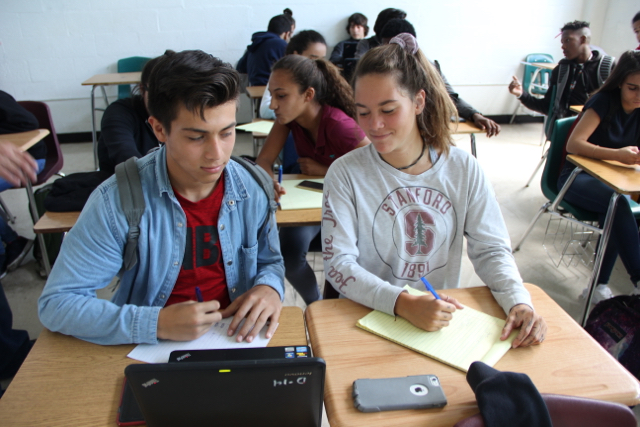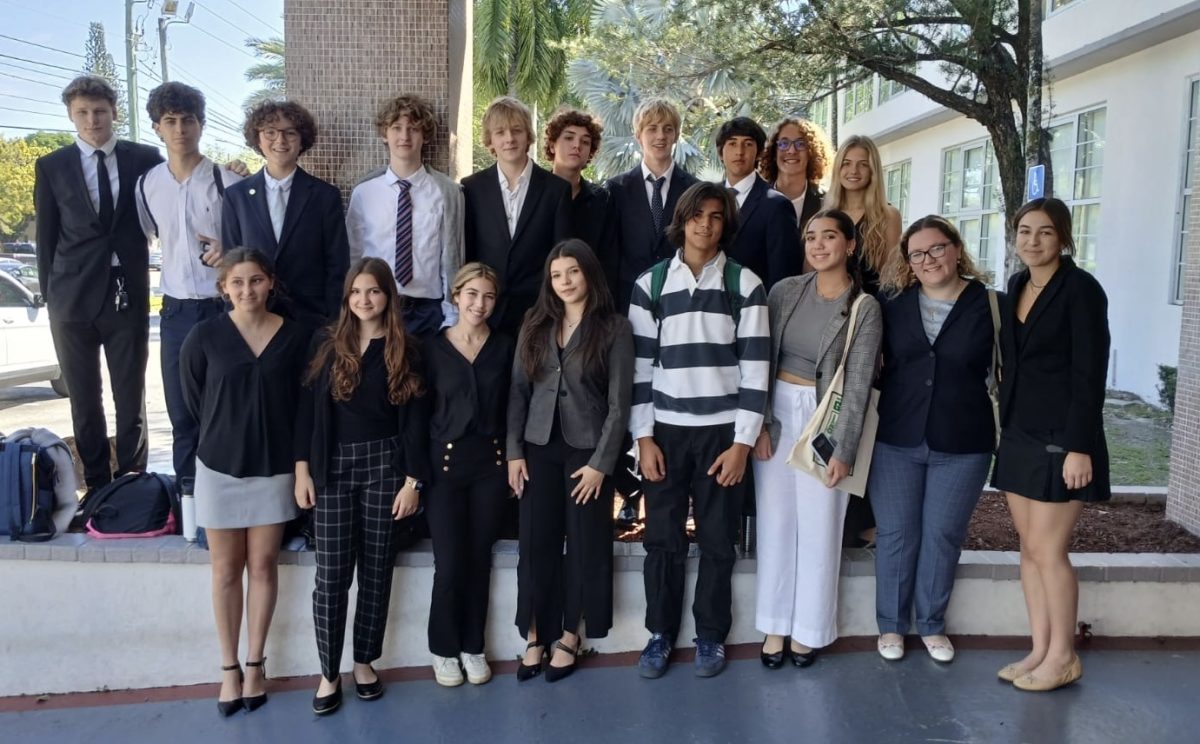The Truth about Academic Dishonesty
Two students cheating off of each other.
Apr 27, 2018
Academic dishonesty is so commonplace across all schools that you have taken part in it without even realizing it. Staying up late to complete assignments perfectly may not always seem to be an option considering the rigorous workload courses might entail. Many students resort to cheating as though it is the only way in which they can bring up or maintain grades without sacrificing social time, sleep, and other activities like sports. Nonetheless, when you cheat, you are sacrificing a very important thing: your education.
“I think it is unfair adding the fact that most students are trying while other people are just cheating. Teachers are looking at the people that are actually trying and they think that we are cheating when in reality, the people that are cheating are getting away with it, creating an environment of distrust,” freshman Daniella Montesino said.
It is not unusual to see a student or two looking over to the next checking if number two is A or B, but it is definitely heinous to not see the dangerous repercussions it can bring. For one thing, this is a complete violation of our academic dishonesty agreement. Whether it be from your core classes or a simple elective, when you sign a syllabus or academy documentation, you are agreeing to not break set rules enforced for all students. There are norms set in place to try to avoid students from compromising their learning: no plagiarizing and penalties for misconduct. Getting caught violating this agreement could result in anything from a detention to full on expulsion from the program or school. In our school website, it is stated that “The creation of a culture of honesty and integrity is integral to our purpose of developing ‘ethical future path makers’ and is underpinned by Coral Gables’s character ideals of honesty, trustworthiness, respect and responsibility.” Academic misconduct disqualifies you from being trusted with any of those character ideals no matter what you did to wrong-do the Academic Honesty Policy.
Not only could cheating and other forms of academic dishonesty get you expelled from school permanently, but decisions like these stay on your record. If your teachers ever warned you about getting referrals, you should listen to them. It only takes one test or a simple essay to be labeled as a cheating student, greatly harming your reputation.
Since most high school students plan on getting a higher education, it is integral that they maintain excellent grades and clean records. Every hopeful applicant must ensure their reputation is not tainted as it will be evident in their application. If a university sees that you have taken part in academic dishonesty, you may have cost yourself a chance at that school. Considering the fact that most jobs require some level of education higher than a school diploma, you might have just missed great life opportunities. Most respected institutions make sure that their future students categorize in former high-schoolers with integrity and confidence in their work, seeing as they are not just looking at your grades, but your possible contributions to their school, community, and workforce.
“I think that academic dishonesty is a person’s choice that will eventually catch up with them. Cheating, plagiarizing, copying, among other things will not get you anywhere in life, especially if you plan on going to college,” freshman Sofia Rebull said.
The most important reason for why this set of guidelines are set in place is because of our educator’s concern for our education. Most students might complain about how we are not going to need the things being taught to us in real life, but unfortunately, school just introduces you to varied topics as a simple start to what you then have to evolve through hard work. As the future generation of pioneers in technology and innovation, cheating just causes you to lag behind from the others, seeing as job prospects are already increasing in competitiveness. By not discerning any of the rules set in place, whether from carelessness or straight rebellion to those that set them in place, we are negating the truth that by making school harder, we are more prepared for the reality of our lives as proper adults. Cheating creates a dependency which can be very harmful to our own knowledge, no matter if we are caught or not. You will be not able to cheat in an end-of-the-year exam, or in finding a decently paying job.
Apart from altering your life opportunities and changing a teacher’s respect for you, you might find that the ones most upset with your actions are your parents and other relatives. You might think that you are making your guardians proud by keeping your grades up, but to a certain moral extent, everything could come crashing down. Whether you get caught or not, academic misconduct also affects the students around you, and our school as a whole. Educational malpractice leaves our teachers believing that we know the topic when in reality it might need more explaining. It also exposes the population of the school to a higher risk of misinformation, seeing as copying and such does not allow the student to think for themselves. If you ever plan on cheating or breaking the ever-so-sacred paper you signed at the beginning of the school year, remember: you are cheating, but more importantly, you are cheating yourself.












